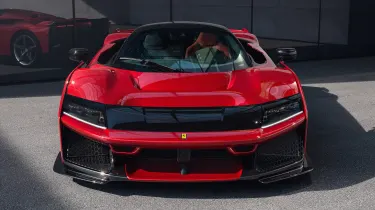
As a ‘once-in-a-decade’ hypercar project, the Ferrari F80 immediately joins the Italian brand's elite. But many fans will be surprised that it forgoes V12 power for a highly-boosted, 1,183bhp hybrid V6 engine.
Given that it has a price tag of over £3m, and will inevitably be compared with 1,258bhp McLaren’s V8-powered W1, it’s understandable that some consider this a controversial decision.
Enrico Galliera, Ferrari’s chief marketing and communications officer, has given some insight into the brand’s thinking.
Galliera said to Auto Express: “We asked the question of whether we were going to use the most iconic engine [the V12] or the highest performing [the V6], and decided to take the highest performer. This is something that we have always done with our supercars, to use the most high performing option available at the time; just look at the F40 and its twin-turbocharged V8.
“We also asked the question about whether an electric or plug-in hybrid powertrain was considered, to which we received an emphatic: ‘No, we think that for now, this is the best technical solution’.”
That technical solution is a complex one, though, because while the cylinder count might be relatively low, the car comes with no fewer than five electric motors as part of its hybrid assistance, some directly driving the wheels and others supporting other mechanical elements such as the turbochargers. This is before we consider the additional four motors that also power the complex active suspension.
It’s also worth noting that despite sharing a similar size and layout with lesser models in the range, such as the 296 GTB, the F80’s 120-degree 3.0-litre V6 is completely bespoke, and able to generate 887bhp on its own.
However, with McLaren’s new W1 featuring a V8 engine, and producing more power, the near £1m price difference in the British car’s favour is likely to attract attention. Commenting on this, Galliera added: “From a commercial perspective, we’re thrilled that McLaren has arrived with a similar supercar, because it generates competition.”
It doesn’t seem to have affected enthusiasm for the new F80, though, with 799 units to be built, and all already sold to Ferrari’s most dedicated clients. In fact, the car is hugely oversubscribed, with the Italian brand having to “manage the many disappointed clients that were unable to secure an allocation”.
